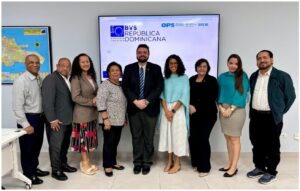The Dominican Republic took a key step in its journey to strengthen national scientific output by holding the first meeting of the Advisory Committee of the country’s Virtual Health Library, informally known as “BVS-DOM“, on May 29, 2025. The meeting took place at the PAHO/WHO headquarters in Santo Domingo and was attended by representatives from universities, documentation centers, medical societies, and agencies of the Ministry of Public Health and Social Assistance (MISPAS) of the country.

A health information milestone
The main objective of the meeting was to establish the operational and strategic foundations for the joint functioning of the BVS-DOM Advisory and Technical Committees, validating work methodologies, institutional responsibilities, and the next steps for consolidating the portal as a reference for open access to scientific and technical health information in the country.
According to Dr. Penélope Parra, from the Knowledge Management Division of MISPAS in the Dominican Republic, “the reactivation of BVS-DOM responds to the need for a collaborative national network capable of supporting evidence-based health decision-making, strengthening scientific research in the country and throughout the Region of the Americas.”
BVS-DOM adopts an integrated governance model, with the creation of Advisory and Technical Committees, relying on the work of a network of cooperating centers. The cooperating centers are made up of institutions such as universities, research institutes, scientific societies, professional associations, ministries or health departments, publishers, and other related institutions—whether governmental, non-governmental, or private—that must employ the LILACS methodology in the management of their scientific and technical information products.
At the meeting, the Technical Committee was defined as responsible for coordinating technical operational actions, structured around three main commissions. The first will be dedicated to managing the portal’s content, ensuring the quality and updating of the information provided. The second commission will focus on supporting and monitoring the ongoing training of cooperating centers, fostering the development of the skills needed to manage and use the resources of BVS-DOM. Finally, the third commission will be responsible for promoting the content and strengthening strategic alliances, expanding the visibility and reach of national scientific output.
Regional cooperation
The process of reactivating BVS-DOM relies on the technical support of BIREME/PAHO/WHO and partners such as the Technological Institute of Santo Domingo (INTEC), in addition to the Ministry of Health of the Dominican Republic. The technical cooperation was recognized and valued during the Advisory Committee meeting. “This coordination strengthens the visibility of Dominican scientific output and brings the country closer to regional best practices in health information management,” said Penélope Parra. According to Pedro López Puig, advisor on Health Systems and Services at the PAHO/WHO Representative Office in the Dominican Republic, “The VHL portal of the Dominican Republic is already an institutionalized reality, the result of joint work and support from BIREME.”
History
The history of BVS-DOM dates back to the late 1980s, when, with the support of BIREME, the first initiatives were launched to organize and democratize access to scientific health information in the country. Between 2001 and 2014, BVS-DOM made significant progress, such as launching the first version of its portal, digitizing official documents, and incorporating records into the LILACS database. Starting in 2021, the Ministry of Health took the lead in the process to reactivate BVS-DOM, culminating in 2023 with the signing of a new interinstitutional agreement.
In 2025, the creation of the Advisory and Technical Committees and the consolidation of a national network of Cooperating Centers mark a new stage of development, connecting the country to the best regional practices in information management and promoting open access to national scientific and technical output.